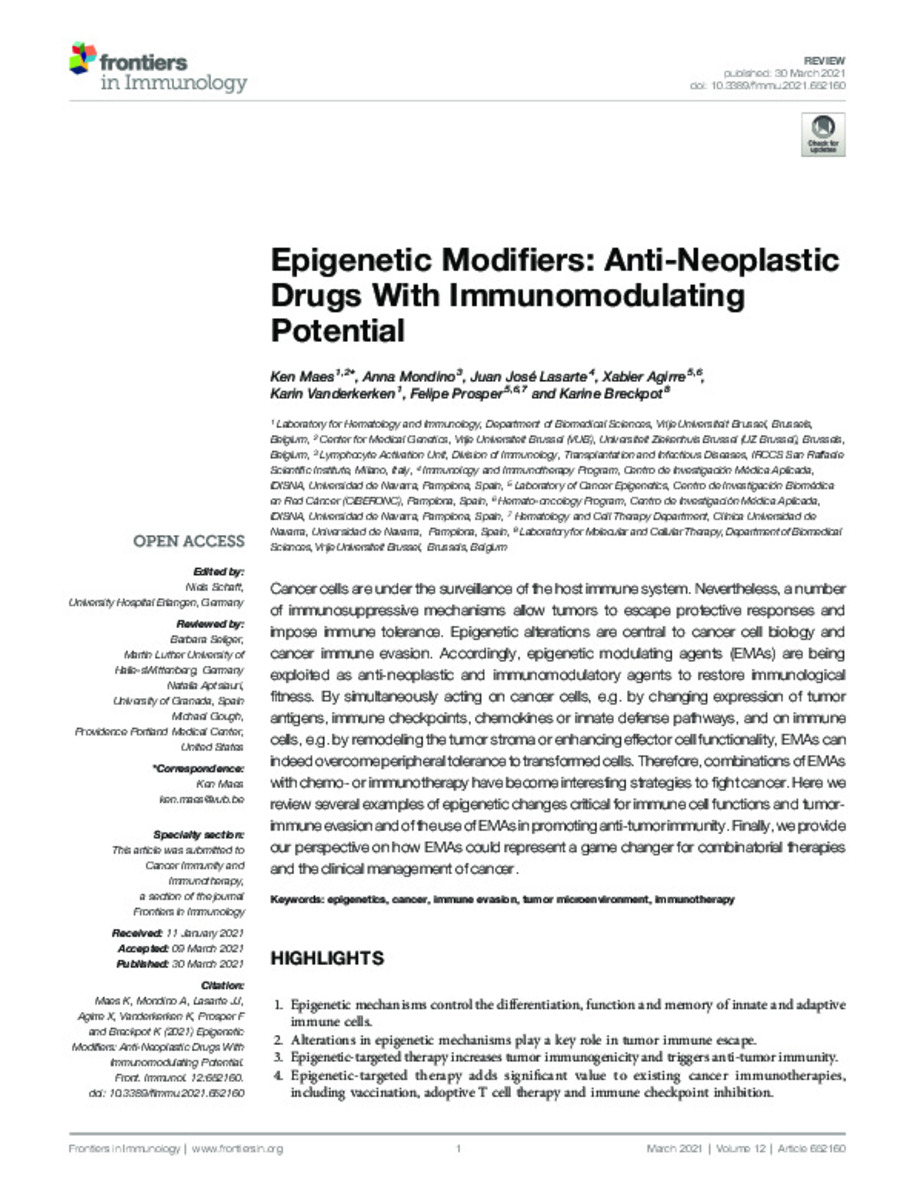Full metadata record
| DC Field | Value | Language |
|---|---|---|
| dc.creator | Maes, K. (Ken) | - |
| dc.creator | Mondino, A. (Anna) | - |
| dc.creator | Lasarte, J.J. (Juan José) | - |
| dc.creator | Aguirre-Ena, X. (Xabier) | - |
| dc.creator | Vanderkerken, K. (Karin) | - |
| dc.creator | Prosper-Cardoso, F. (Felipe) | - |
| dc.creator | Breckpot, K. (Karine) | - |
| dc.date.accessioned | 2021-09-14T06:50:42Z | - |
| dc.date.available | 2021-09-14T06:50:42Z | - |
| dc.date.issued | 2021 | - |
| dc.identifier.citation | Maes, K.; Mondino, A.; Lasarte-Sagastibelza, J. (Juan José); et al. "Epigenetic modifiers: anti-neoplastic drugs with immunomodulating potential". Frontiers in Immunology. 12, 2021, 652160 | es |
| dc.identifier.issn | 1664-3224 | - |
| dc.identifier.uri | https://hdl.handle.net/10171/61988 | - |
| dc.description.abstract | Cancer cells are under the surveillance of the host immune system. Nevertheless, a number of immunosuppressive mechanisms allow tumors to escape protective responses and impose immune tolerance. Epigenetic alterations are central to cancer cell biology and cancer immune evasion. Accordingly, epigenetic modulating agents (EMAs) are being exploited as anti-neoplastic and immunomodulatory agents to restore immunological fitness. By simultaneously acting on cancer cells, e.g. by changing expression of tumor antigens, immune checkpoints, chemokines or innate defense pathways, and on immune cells, e.g. by remodeling the tumor stroma or enhancing effector cell functionality, EMAs can indeed overcome peripheral tolerance to transformed cells. Therefore, combinations of EMAs with chemo- or immunotherapy have become interesting strategies to fight cancer. Here we review several examples of epigenetic changes critical for immune cell functions and tumor-immune evasion and of the use of EMAs in promoting anti-tumor immunity. Finally, we provide our perspective on how EMAs could represent a game changer for combinatorial therapies and the clinical management of cancer. | - |
| dc.description.sponsorship | KM, KV, and KB: This work was funded by FWO-Vlaanderen and Vrije Universiteit Brussel under the strategic research program scheme SRP48 and ERA-NET TRANSCAN-2 2015 (EPICA) under research grant G0H7216N and Wetenschappelijk Fonds Willy Gepts of the UZ Brussel. FP, XA, and JJL: This work was funded by Foundation for Applied Medical Research, University of Navarra (Pamplona, Spain), Fundación Fuentes Dutor, Instituto de Salud Carlos III (ISCIII) PI16/02024, PI17/00701, PI20/01306, Ministerio de Ciencia e Innovación (PID2019-108989RB-I00) and ERA-NET TRANSCAN-2 2015 AC16/00041 (EPICA), co- financed with FEDER funds), MINECO Explora SAF2017-92632- EXP (RTHALMY), Multiple Myeloma Research Foundation Networks of excellence, the International Myeloma Foundation (Brian D. Novis), and the Qatar National Research Fund award 7- 916-3-237. AM: This work was funded by ERA-NET TRANSCAN- 2015—EPICA and Associazione Italiana per la Ricerca sul Cancro (AIRC IG 2014 Id.15883 and 2018 Id.21763). | - |
| dc.language.iso | en | - |
| dc.rights | info:eu-repo/semantics/openAccess | - |
| dc.subject | Epigenetics | - |
| dc.subject | Cancer | - |
| dc.subject | Immune evasion | - |
| dc.subject | Tumor microenvironment | - |
| dc.subject | Immunotherapy | - |
| dc.title | Epigenetic modifiers: anti-neoplastic drugs with immunomodulating potential | - |
| dc.type | info:eu-repo/semantics/review | - |
| dc.description.note | This is an open-access article distributed under the terms of the Creative Commons Attribution License (CC BY). | - |
| dc.identifier.doi | 10.3389/fimmu.2021.652160 | - |
| dadun.citation.publicationName | Frontiers in Immunology | - |
| dadun.citation.startingPage | 652160 | - |
| dadun.citation.volume | 12 | - |
Files in This Item:
Statistics and impact
Items in Dadun are protected by copyright, with all rights reserved, unless otherwise indicated.






